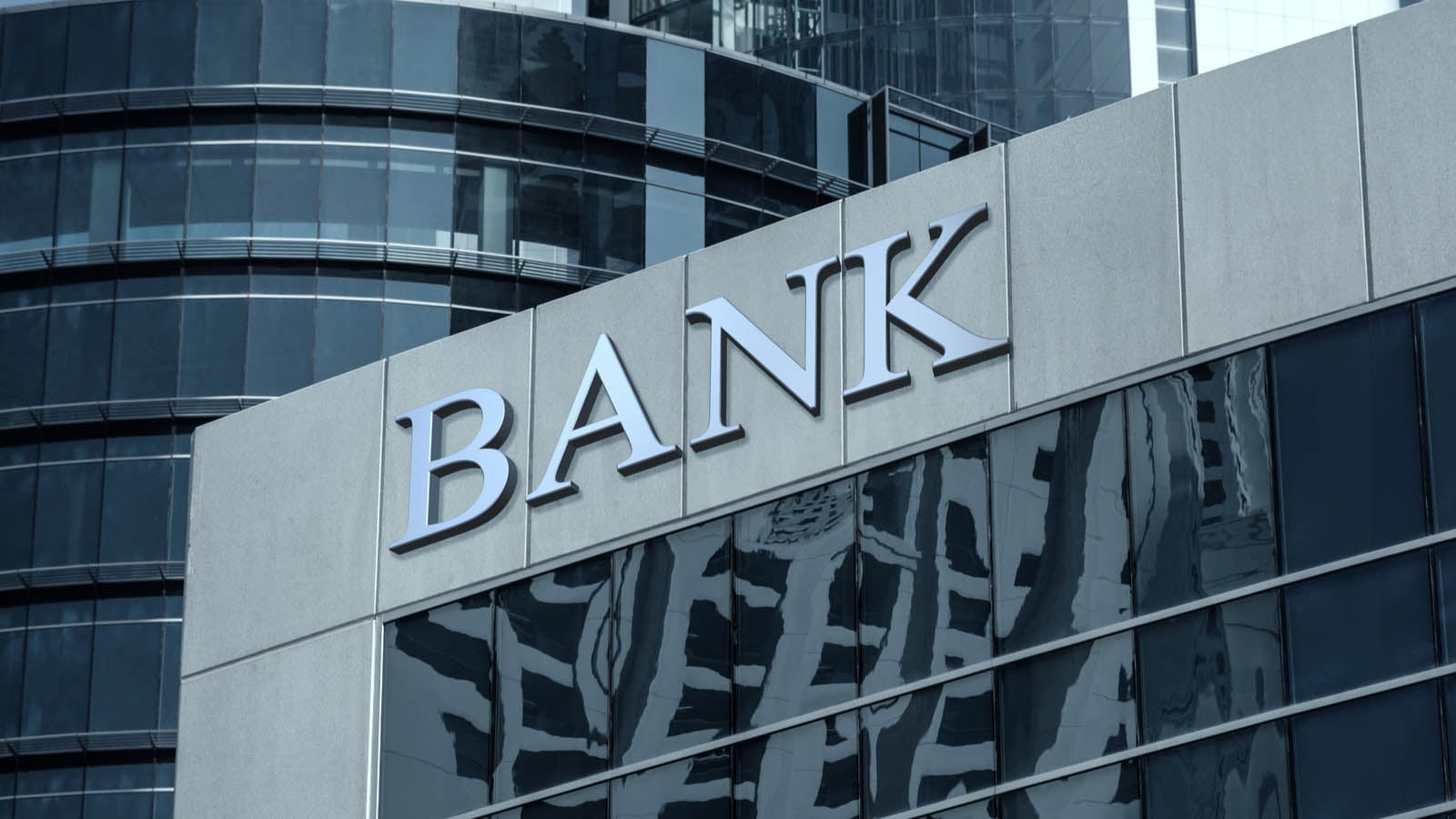Bank stocks have been one of the year’s worst-performing sectors. The median U.S. banking stock is down close to 30% on the year, and many international banks are posting similarly poor performance.
The novel coronavirus has done a number on bank earnings. There’s obviously the rising risk of loan losses as consumers and businesses deal with lockdowns and increasingly unemployment. Behind the scenes, another matter lurks. Falling interest rates due to the economic slowdown pressure bank results going forward.
Add it all up, and financials have taken a bruising. However, we appear to be turning the corner. Q2 bank earnings have been much stronger than expected in aggregate. Financial sector exchange-traded-funds are moving upward, and some individual bank stocks have surged following earnings.
This is, in fact, a great time to go bargain-hunting in the sector. However, don’t buy bank stocks indiscriminately just yet. Some banks are well-positioned for this economic environment. Others are not. Here are seven bank stocks that still face severe obstacles in coming months and thus shouldn’t be on your buy list yet:
- Capital One (NYSE:COF)
- PNC Financial Services (NYSE:PNC)
- Citigroup (NYSE:C)
- HSBC (NYSE:HSBC)
- Banco Santander (NYSE:SAN)
- Westpac (NYSE:WBK)
- Toronto-Dominion Bank (NYSE:TD)
Let’s take a closer look at these downtrodden bank stocks.
Capital One (COF)
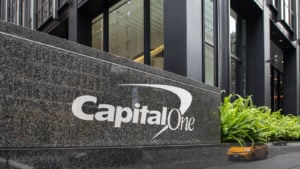
You may think of Capital One as a credit card company. And, indeed, the company issues a ton of cards. However, it’s a vastly different business from Visa (NYSE:V) or Mastercard (NYSE:MA). Visa and Mastercard run the payment networks and collect transaction fees. But they don’t take significant credit risk.
Capital One, by contrast, is on the other end of the ledger. It is a bank holding company that, instead of making mortgages and commercial loans, primarily does credit cards. It earns income shouldering the credit risk when consumers borrow to make purchases. As such, Capital One is right in the eye of the current market storm.
And Tuesday highlighted the risk. COF stock sagged in after-hours trading following a downbeat earnings report. The company swung to an outright accounting loss thanks to soaring loan loss provisions. For the quarter, Capital One provisioned more than $5 billion of upcoming credit card write-offs. That was up sequentially from the $4 billion for the March quarter, and way up from the $1.3 billion it expensed on this item in Q2 of 2019.
Now, to be sure, we don’t know how much money Capital One will lose thanks to this recession. However, their conference call wasn’t reassuring. When asked, the company said that it didn’t know how many of its clients are currently unemployed. And with the enhanced unemployment benefits set to roll off shortly unless Congress takes quick action, credit losses could soar over the next quarter or two. COF stock surged from the March low of $38 back to $60 recently. Don’t count on those gains to continue.
PNC Financial Services (PNC)
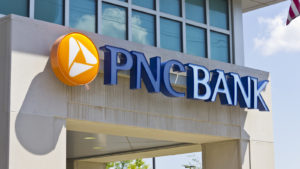
PNC Financial Services is one of the nation’s largest regional banks. It holds deposits of $346 billion, and has a market capitalization of nearly $50 billion, making it a mover and shaker on the national banking scene.
Indeed, it generated big headlines recently when it dumped its formerly gigantic stake in asset manager BlackRock (NYSE:BLK). In that sale, PNC raised $14 billion. That secured its balance sheet to withstand the current recession. It also gives management a huge war chest with which it plans to buy up other smaller banks.
However, this could leave investors hanging. For one, PNC sold its BlackRock stake during the recent market turmoil, and thus didn’t get top dollar for its position. Indeed, it sold its BLK stock for $420 per share; it’s now trading at $580. With BlackRock’s passive ETFs continuing to dominate the money management game, PNC owned a great asset in BlackRock. Instead, it got rid of that at a discounted price and now wants to buy up more regional banks. That could be a reasonable move, but it’s one that adds considerable execution risk.
On top of that uncertainty, PNC’s core operations have hit a rough patch. The bank reported an operating loss this quarter due to rising loan loss provisions. PNC is a bank in transition that is showing weakness in its core lending business. That makes it a questionable pick within the banking sector right now.
Citigroup (C)
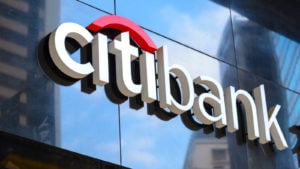
I’ve banked at Citi for many years. It offers fine customer service, particularly for those of us who spend a great deal of time traveling internationally. However, while its service is good, its investment qualities are distinctly less attractive. Citi’s stock traded for $500 (adjusting for reverse splits) prior to the financial crisis. So its pre-Covid recovery barely started to register for long-term holders. And now shares are heading lower yet again; C stock is down from $80 to $52 so far this year.
In all credit to the bank, its earnings report last week was actually pretty good. However, much of that was due to robust activity on the investment banking side — with the hot market for tech stocks, there’s good money to be made. If you want exposure to that trend, buying Goldman Sachs (NYSE:GS) stock is the easier trade on higher investment banking fees.
While Goldman is heavily reliant on investment banking, Citi’s overall prospects are dragged down by a consumer bank that continues to struggle. The bank is reporting falling interest margins, with card revenues in particular sinking. Citi’s franchise in Mexico is showing particular weakness. While Citibank is adequately capitalized and in no great existential danger, its stock shows few signs of breaking the long string of disappointing results either.
HSBC (HSBC)
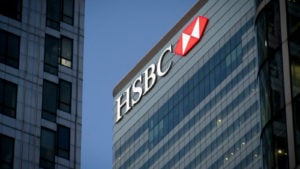
Britain’s HSBC may seem like a solid diversified banking pick at first glance. It’s Europe’s largest bank by total assets, and is of equivalent size to the U.S.’ largest banks. It has operations in dozens of countries, and has remained reasonably profitable even as many other European banks have slumped.
However, there are a few things that put HSBC in a precarious position. One, it has traditionally had a large business operation in Hong Kong. So large, in fact, that HSBC’s stock has two primary listings: Hong Kong and London. The name HSBC also serves as an acronym for the Hong Kong and Shanghai Banking Corporation.
As HSBC has a home listing in Hong Kong, it is a key stock for the indexes and funds there. That puts it at risk thanks to all the political unrest and uncertainty there. China has been cracking down on Hong Kong politically, and the U.S., in turn, has said that it is reconsidering Hong Kong’s status as a special financial entity. This could crush HSBC’s outlook.
More broadly, HSBC operates in nearly all corners of the world, and is exposed to a bushel of emerging markets. In the current pandemic, it seems countries like Brazil, India and Mexico are getting hit much harder than most developed countries. This exposes banks operating in these economies to considerable additional risk. Banking is complicated enough right now, there’s no need to take on an especially fraught situation with HSBC stock.
Banco Santander (SAN)
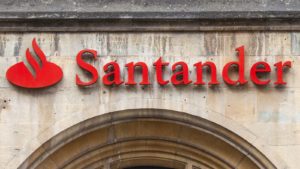
Speaking of struggling emerging markets, we have Santander. Santander is the Spanish banking conglomerate. In addition to its European banking business, it also has subsidiaries all around the Americas, with sizable operations in Mexico, Brazil, Chile and more.
Santander faces a difficult situation in that none of its markets are doing particularly well. The Spanish economy has been in a slump for more than a decade now. With declining demographics and a huge debtload, the Spanish economy has never recovered from a dramatic real estate bust in the late 2000s. Even at near-zero interest rates, few borrowers want to buy homes or expand their businesses, leading to sour profit margins.
Meanwhile, in the Americas, the combination of coronavirus and plunging commodity prices have ravaged the local economies. Throw in a sprinkle of political unrest in countries such as Chile and Brazil, and the continent is having a nasty year. While South America will eventually bottom, there’s no sign of a turnaround yet. It’s likely that emerging markets won’t recover until developed markets already are well into an upswing, meaning that it’s much too early to buy Santander stock.
If you really want to own a piece of Santander, its best asset, Banco Santander Mexico (NYSE:BSMX) is publicly listed. Mexico should recover faster than most of Santander’s other markets given Mexico’s close ties to the U.S., including the new free trade agreement enacted this past month.
Westpac (WBK)

Westpac may not be a household name for some investors, but it is a huge firm. Even after dreadful stock performance this year, Westpac still has a market capitalization of $45 billion. That’s because Westpac is one of Australia’s leading banks, and until 2020, that was a great place to be.
In fact, Australia enjoyed a record 29 year economic expansion. 2001? 2008? Australia kept growing, even as the rest of the world teetered on the brink. Now, however, the chickens have come home to roost. Australia’s economic expansion finally ended this year; it’s in recession like everyone else. This puts their record housing boom at risk of an ugly ending — already the Australian Central Bank is worried about a 15% decline in housing prices and is considering measures to restrict market transactions to keep prices from falling.
As if that weren’t enough, Westpac has created troubles of its own account. Australia’s financial crimes regulator sued Westpac for 23 million alleged breaches of anti-money laundering laws. Disturbingly, many of these breaches reportedly involved child exploitation.
To summarize, Westpac’s robust domestic economic picture has suddenly turned cloudy. Australia’s long-lived housing bubble is in grave danger. And Westpac itself is embroiled in a bitter scandal. I know a lot of folks own Westpac for its unusually generous dividend yield; it currently pays more than 9%. Don’t let that blind you to the massive risk that shares hold here going forward though.
Toronto-Dominion Bank (TD)
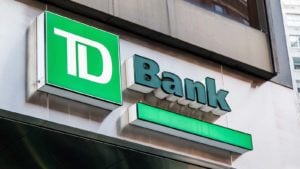
Australia is hardly the only country with an inflated housing market. Canada, like Australia, saw its housing bubble withstand the 2008 setback and immediately go on to new highs. Prices reached extreme peaks. At year-end 2019, the average two-story house in Vancouver cost almost 1.5 million CAD ($1.1 million). Even your median Vancouver condo cost 645,000 CAD.
Only in Silicon Valley can you find similar American hysteria to the sorts of prices Canadian homes recently reached. However, unlike Silicon Valley, in Canada, there’s no huge tech industry creating high-paying jobs to support these sky-high residential real estate prices.
And now, the Canadian housing market appears to be cracking. Politicians have put in place harsher laws to restrict property speculation. Combine that with a drop in demand from Asian buyers for Canadian homes given the global economic mess, and Canada could be in for a rough go of it. It doesn’t help matters that the energy sector — a major job creator in Canada — is currently in turmoil.
Canadian banks bulls have long argued that economic weakness isn’t a big deal to their banks. After all, Canada’s government backstops many home mortgages. It looks like we’re about to see just how strong those insurance policies are. In any case, it’s common sense to avoid banking shares in countries where the economy is rapidly losing steam. Canada’s long-inflated housing market looks set for a quick correction, and that should keep TD stock in the penalty box for the next year.
Ian Bezek has written more than 1,000 articles for InvestorPlace.com and Seeking Alpha. He also worked as a Junior Analyst for Kerrisdale Capital, a $300 million New York City-based hedge fund. You can reach him on Twitter at @irbezek. At the time of this writing, he owned BSMX and GS stock.
